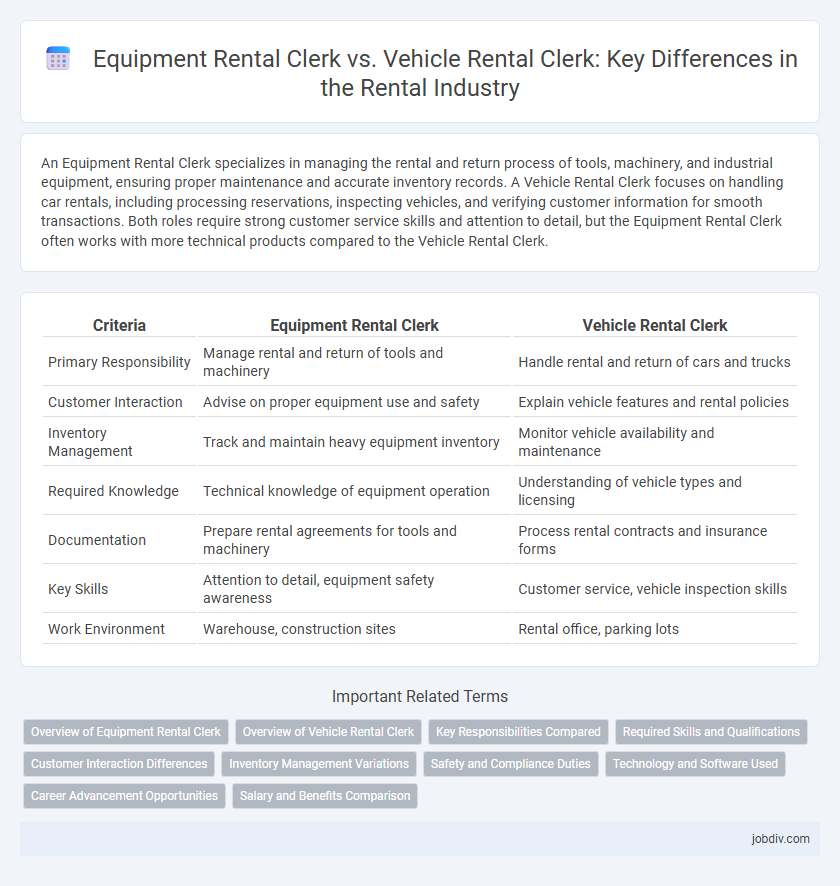An Equipment Rental Clerk specializes in managing the rental and return process of tools, machinery, and industrial equipment, ensuring proper maintenance and accurate inventory records. A Vehicle Rental Clerk focuses on handling car rentals, including processing reservations, inspecting vehicles, and verifying customer information for smooth transactions. Both roles require strong customer service skills and attention to detail, but the Equipment Rental Clerk often works with more technical products compared to the Vehicle Rental Clerk.
Table of Comparison
| Criteria | Equipment Rental Clerk | Vehicle Rental Clerk |
|---|---|---|
| Primary Responsibility | Manage rental and return of tools and machinery | Handle rental and return of cars and trucks |
| Customer Interaction | Advise on proper equipment use and safety | Explain vehicle features and rental policies |
| Inventory Management | Track and maintain heavy equipment inventory | Monitor vehicle availability and maintenance |
| Required Knowledge | Technical knowledge of equipment operation | Understanding of vehicle types and licensing |
| Documentation | Prepare rental agreements for tools and machinery | Process rental contracts and insurance forms |
| Key Skills | Attention to detail, equipment safety awareness | Customer service, vehicle inspection skills |
| Work Environment | Warehouse, construction sites | Rental office, parking lots |
Overview of Equipment Rental Clerk
An Equipment Rental Clerk manages the rental process for machinery, tools, and heavy equipment, ensuring accurate inventory tracking and customer transactions. This role requires knowledge of equipment specifications, maintenance schedules, and safety regulations to support efficient operations. Unlike a Vehicle Rental Clerk, who handles cars and trucks, an Equipment Rental Clerk focuses on industrial and construction equipment rental needs.
Overview of Vehicle Rental Clerk
Vehicle Rental Clerks specialize in managing the rental process of cars, trucks, and other vehicles, ensuring accurate reservation handling and customer verification. They handle vehicle check-outs and returns, perform inspections, process payments, and maintain rental agreements. Expertise in vehicle types, insurance policies, and regulatory compliance is essential for efficient vehicle rental operations.
Key Responsibilities Compared
An Equipment Rental Clerk manages the inventory, maintenance schedules, and safety inspections of tools and machinery, ensuring timely readiness for customer use, while also processing rental agreements and payments. Conversely, a Vehicle Rental Clerk primarily handles customer service tasks such as vehicle check-in and check-out, verifying driver's licenses, inspecting vehicles for damages, and coordinating insurance documentation. Both roles require strong record-keeping and customer communication skills but differ significantly in the type of assets managed and compliance with industry-specific regulations.
Required Skills and Qualifications
Equipment Rental Clerks must possess strong knowledge of machinery operation, inventory management, and safety regulations, often requiring certifications in handling specialized equipment. Vehicle Rental Clerks focus on customer service, driver's license verification, and familiarity with fleet management software, typically needing excellent communication skills and experience in contract processing. Both roles demand attention to detail, organizational abilities, and basic math skills for billing and record-keeping.
Customer Interaction Differences
Equipment Rental Clerks specialize in handling tools and machinery, requiring detailed explanations of technical specifications and safety guidelines to customers. Vehicle Rental Clerks focus on verifying driver qualifications, insurance details, and facilitating test drives or vehicle inspections. Customer interactions in equipment rental often involve more instructional support, while vehicle rental emphasizes legal compliance and quick service.
Inventory Management Variations
Equipment Rental Clerks manage diverse inventory including tools, machinery, and specialized equipment, requiring detailed tracking of serial numbers, maintenance schedules, and usage hours to ensure operational readiness and safety compliance. Vehicle Rental Clerks focus on automobiles, emphasizing odometer tracking, fuel levels, and condition reports to monitor wear and tear and schedule timely servicing. Inventory management variations stem from the different maintenance demands and usage monitoring metrics specific to equipment types versus vehicles in rental operations.
Safety and Compliance Duties
Equipment Rental Clerks ensure safety by inspecting and maintaining machines to comply with OSHA regulations, verifying that all rental equipment meets industry safety standards before release. Vehicle Rental Clerks focus on conducting thorough vehicle condition checks, enforcing legal compliance such as valid licensing, and ensuring customers understand terms related to liability and insurance coverage. Both roles prioritize adherence to safety protocols and regulatory requirements to minimize risks and protect customers and company assets.
Technology and Software Used
Equipment Rental Clerks utilize inventory management software and barcode scanning technology to track asset availability and maintenance schedules efficiently, often working with heavy machinery and specialized tools. Vehicle Rental Clerks rely on fleet management systems and GPS tracking software to monitor vehicle status, optimize rental periods, and ensure timely maintenance. Both roles increasingly adopt integrated digital platforms for booking, payment processing, and customer relationship management to streamline operations and enhance service delivery.
Career Advancement Opportunities
Equipment Rental Clerks gain specialized skills in handling, inspecting, and maintaining diverse machinery, preparing them for supervisory roles in warehouse or operations management. Vehicle Rental Clerks develop expertise in customer service, fleet management, and insurance processing, which can lead to positions such as branch manager or fleet coordinator. Both career paths offer advancement opportunities, but choice depends on whether one prefers focus on heavy equipment logistics or automotive rental services.
Salary and Benefits Comparison
Equipment Rental Clerks typically earn an average annual salary ranging from $30,000 to $40,000, while Vehicle Rental Clerks usually have a salary range of $28,000 to $38,000, depending on location and experience. Equipment Rental Clerks often receive benefits such as medical insurance, retirement plans, and paid time off, which are comparable to the benefits packages offered to Vehicle Rental Clerks but may include additional training allowances for handling specialized machinery. Both positions generally offer opportunities for overtime pay, performance bonuses, and employee discounts that enhance their overall compensation.
Equipment Rental Clerk vs Vehicle Rental Clerk Infographic

 jobdiv.com
jobdiv.com